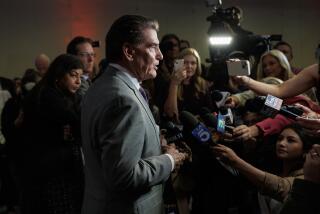McCain denies claims about lobbyist
Sen. John McCain strongly denied allegations Thursday that he was warned during his first White House campaign, in 2000, to avoid meetings with a female telecommunications lobbyist who allegedly claimed to have special access to the senator and his aides.
McCain, the likely Republican presidential nominee, denied any improper relationship with the woman, Vicki Iseman, whom he called a friend.
He criticized a lengthy New York Times article suggesting that he had aided Iseman by helping her clients. He said it was “not true.”
McCain’s wife, Cindy, stood beside him at a news conference at a hotel in Toledo, Ohio. Asked to comment, she called her husband a “man of great character” who would not do anything to “disappoint the people of America.”
McCain’s aides and supporters angrily portrayed the controversy as a political hit job designed to sully the four-term Arizona senator and war hero as he struggled to unite the Republican Party. Polls show that many conservative and evangelical voters have not embraced McCain.
By midafternoon, McCain’s campaign manager, Rick Davis, issued a fundraising solicitation that sought to tap public resentment of the media. The letter denounced a “sleazy smear attack from a liberal newspaper against the conservative Republican front-runner” and pleaded for contributions to “counteract the liberal establishment.”
McCain has led the effort in Congress to end campaign finance abuses and improper influence of lobbyists and special interests. Any indication that he had acted imprudently, especially during the years he headed the powerful Senate Commerce Committee, could undermine a key plank of his White House campaign.
The case, however, could benefit McCain if voters concluded that he and his family were unfairly victimized.
In a telephone interview, John Weaver, one of McCain’s top aides in the last campaign, told the Los Angeles Times that he had asked Iseman to meet him at a cafe in Union Station, the main train depot in Washington, in late 1999.
“It lasted only a few minutes, maybe five or six minutes,” he said. “In the course of that, I informed her that her comments that she had strong ties to [Commerce] committee staff, to his personal staff and to Sen. McCain were untrue and harmful, and it had to stop.”
Iseman, he said, was “telling people that she had close ties, that she could get things done. My position as top campaign person was this was harmful to the campaign. It was inaccurate. . . . Most lobbyists are guilty of bragging. But it was constant. We kept hearing about it.”
Asked what Iseman’s response was to his complaint, Weaver said, “She got up and left. That’s why the meeting was so short.”
Weaver said he did not inform McCain about the meeting. His statement, therefore, did not contradict McCain’s denial that he was warned to avoid Iseman.
Iseman did not respond to telephone and e-mail requests for comment Thursday. She is a partner at Alcalde & Fay, a lobbying firm in Washington, and represents telecommunications corporations and other clients before the House and Senate Commerce committees, according to the firm’s website.
In the news conference, McCain said he had seen Iseman “on occasions, particularly at receptions and fundraisers and appearances before the committee. . . . I consider her a friend.”
Kevin Fay, a senior partner in Iseman’s lobbying firm, said in a statement that the New York Times article was “based upon the fantasies of a disgruntled former campaign employee and is without foundation or merit.”
The New York Times and the Washington Post reported in stories posted Wednesday night on their websites and published Thursday that unnamed former associates of McCain said they had repeatedly warned him to avoid Iseman.
No one publicly emerged Thursday to confirm the accounts.
More than a dozen current and former senior McCain aides challenged the claims.
Mark Salter, one of McCain’s closest aides, said in an e-mail that no one sought to bar Iseman from McCain’s office, that senior staff did not discuss her as a possible problem, and that she continued to lobby McCain and his staff after 2000.
Mike Murphy, who was a senior strategist to McCain’s 2000 presidential campaign, said he “knew just about everything” that happened at that time and was unaware of any internal discussions about Iseman.
He summed up what he knew about her during that period in one word: “Zilch.”
Far from damaging McCain’s candidacy, Murphy said, the article could redound to McCain’s benefit if voters wind up sympathizing with him.
“It’s an axiom of American politics -- and I don’t think this is a conservative or liberal thing -- that when people think you’ve been given an unfair cheap shot by the media, they’re sympathetic,” he said.
Indeed, Rush Limbaugh, the conservative radio star and one of McCain’s harshest Republican critics, rushed to his defense Thursday.
“The lesson is liberals are to be defeated,” Limbaugh said, according to a transcript on his website. “ . . . You cannot welcome their media members on your bus and get all cozy with them and expect eternal love from them. You are a Republican.”
To support its point that the senator did not show favoritism toward Iseman’s lobbying firm, the McCain campaign Thursday provided news organizations with a list of 13 bills he introduced from 1997 to 2006 that the campaign said were contrary to the interests of Iseman, her firm or their clients.
Among Iseman’s clients during that time were several broadcasters, including the former Paxson Communications Corp., Univision Communications Inc., as well as Carnival Cruise Lines, according to lobbying records.
One McCain bill would have required broadcasters to give free airtime to political candidates and charge their lowest rates for campaign ads. Another would have increased regulatory oversight of TV and radio station licenses and forced broadcasters to apply for renewals every three years instead of every eight years.
McCain also pushed to allow more low-power community radio stations, which large broadcasters worried would interfere with their signals.
In addition, McCain proposed legislation to allow more cruise ships to call on U.S. ports, which the cruise ship industry opposed. None of the bills cited by McCain’s campaign became law.
The controversy refocused attention on letters that McCain wrote in 1999 to federal regulators on behalf of Paxson Communications, which had hired Iseman as its lobbyist.
In November and December of that year, McCain wrote to the Federal Communications Commission to express his “concern about the commission’s continuing failure to act on” license applications by Paxson to take control of a television station in Pittsburgh. He did not specifically ask the FCC to approve the proposal.
McCain wrote the letters after receiving contributions from Paxson’s top executives and after flying on Paxson’s corporate jet as part of his campaign.
The FCC chairman, William E. Kennard, complained at the time that McCain’s request “could have procedural and substantive impacts on the commission’s deliberations and, thus, on the due process rights of the parties.”
--
jim.puzzanghera@ latimes.com
Times staff writers Tom Hamburger and Peter Nicholas in Washington and Dan Morain in Sacramento contributed to this report.
More to Read
Sign up for Essential California
The most important California stories and recommendations in your inbox every morning.
You may occasionally receive promotional content from the Los Angeles Times.












